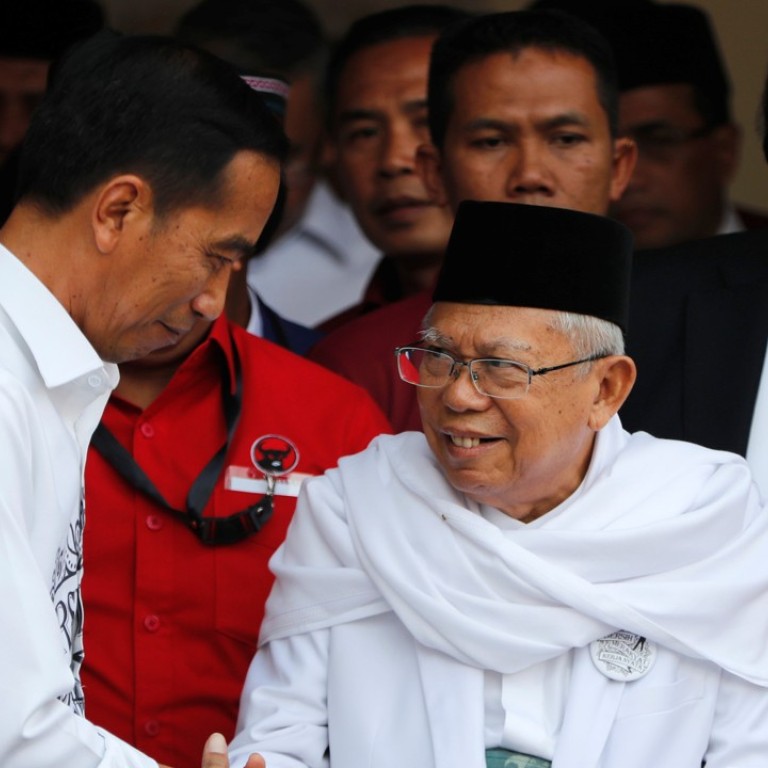
What Widodo’s pick for veep says about Indonesian politics
After years of battling sectarian politics and attacks on the strength of his religious beliefs, Indonesia’s president has joined forces with Islamic leader Ma’ruf Amin to boost his election chances
As a practising Muslim from a traditional Javanese heartland, President Joko Widodo’s Islamic credentials should be beyond question.
But after years of battling sectarian politics and repeated attacks on the strength of his religious beliefs, Indonesia’s leader has joined forces with an Islamic cleric and figurehead of the world’s largest Muslim organisation in an effort to win re-election.
The man, universally known as “Jokowi”, ended months of speculation on Thursday by picking 75-year-old Islamic scholar Ma’ruf Amin as his running mate for next year’s presidential election. Their challenger is controversial former Army General Prabowo Subianto, who raised eyebrows by confirming deputy governor of Jakarta, Sandiaga Uno, as his own running mate just hours before the Friday deadline.
Caught between an earthquake and sex abuse in Indonesia
The contest is a repeat of the 2014 presidential election, when Widodo, 57, from Surakarta, Central Java – perceived as a fresh challenger to vested political interests – defeated Prabowo, 66, a charismatic firebrand with deep ties to Indonesia’s business and military elite.
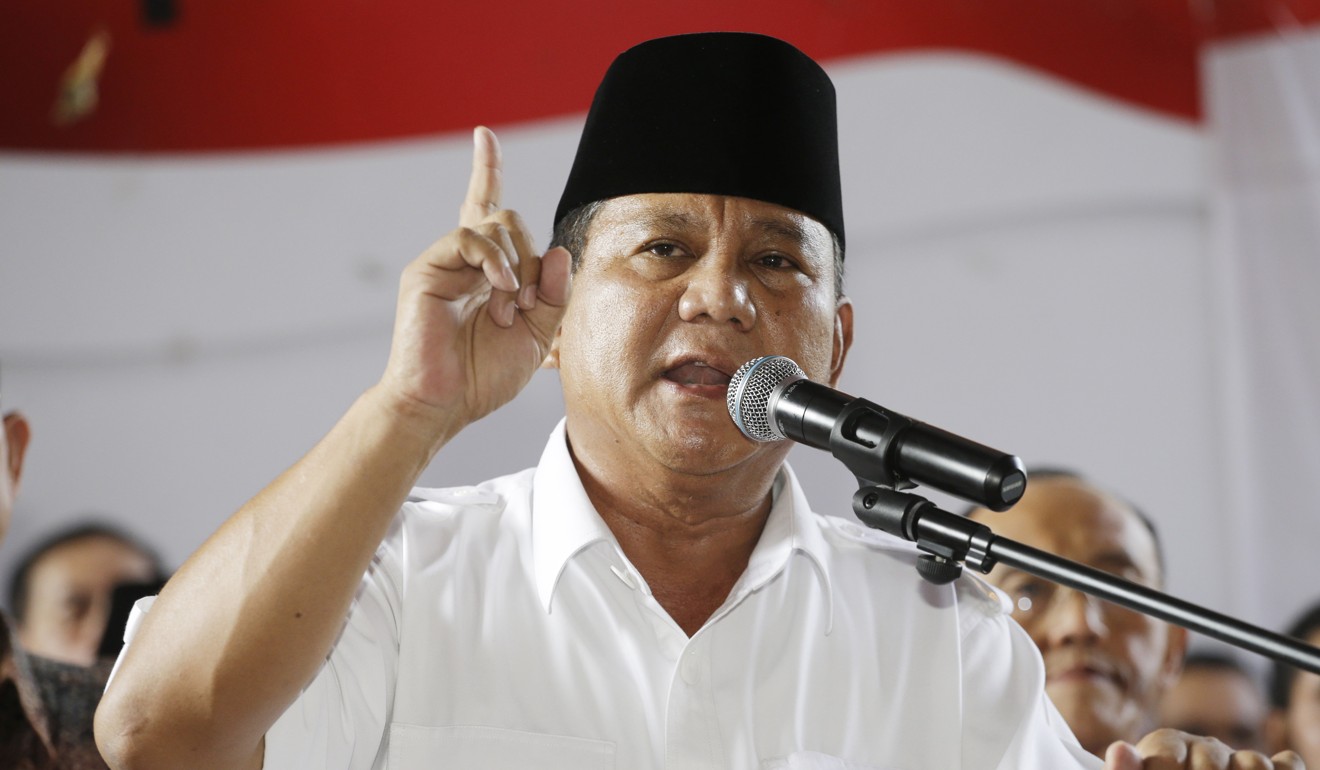
But the eleventh-hour choices for vice-president demonstrate the long shadows cast by Jakarta’s divisive gubernatorial election last year, which saw Widodo’s political ally, the ethnic Chinese Christian Basuki Tjahaja Purnama (inset), known as “Ahok”, accused of blasphemy. The president’s new running mate Amin played a decisive role in the 2017 polls when, amid heated protests by Muslim groups in the streets and online, he publicly condemned Purnama for insulting the Koran, despite contested evidence. As head of the Indonesian Ulama Council, he testified against Purnama at the resulting trial, which saw the former Jakarta governor sentenced to two years in prison much to the dismay of human rights and secular activists.
Has Malaysia moved past race-based politics? By-election will give first clue
Prabowo’s candidate, Anies Baswedan, won the 2017 campaign alongside Uno, 49, a former businessman and investor who will now stand for vice-president. After last year’s victory, Uno said it was regrettable that race and religion had dominated the Jakarta campaign.
But Widodo’s decision to align himself with Amin – formerly a presidential adviser who also leads the traditionalist Muslim association Nahdlatul Ulama (NU), which has an estimated 40 million members – may help shield the president from religious attacks that have long hounded him.
“Jokowi has learned from the fall of Ahok [Purnama]”, said Arya Fernandes, researcher at the Centre for Strategic and International Studies. “After the demonstrations by the Islamic community to influence the Jakarta governor election, Jokowi has had massive concerns about the expression of Muslim opinion in politics. The choice of [Amin] is to appeal to the traditional Muslim voters, who are represented by NU, and in general, Muslim voters in Indonesia are moderate.”
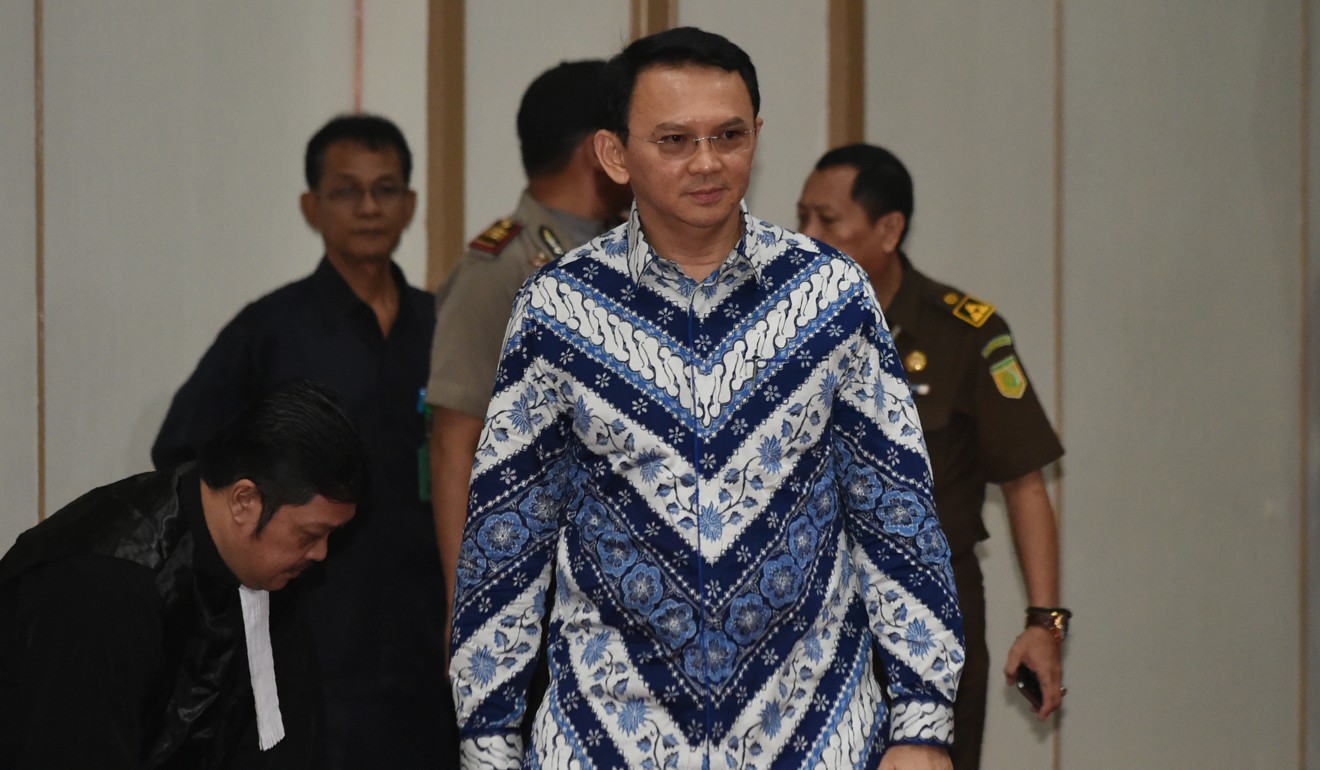
Amid the rise of hardline Islamist groups in the world’s third-largest democracy and most populous Muslim-majority country, President Widodo has faced repeated criticisms for not being Muslim enough.
Richard Van der Schaar, managing director of the business consultancy Indonesia Investments, said Widodo’s choice was to silence those criticisms.
“Jokowi is courting the Muslim vote and this started because of Ahok’s experience in Jakarta, there were a lot of demonstrations and a rise in religious tensions and Jokowi himself came under attack because he was an ally of Ahok,” he said.
Van der Scharr said it was likely that the cleric – who issued a fatwa in 2005 condemning secularism liberalism and pluralism as “deviant” – may not have been the president’s first choice. “It seems that Mahfud MD was actually his first choice but a couple of political parties in Jokowi’s coalition could not agree with that. We saw a similar story with Prabowo’s appointment.”
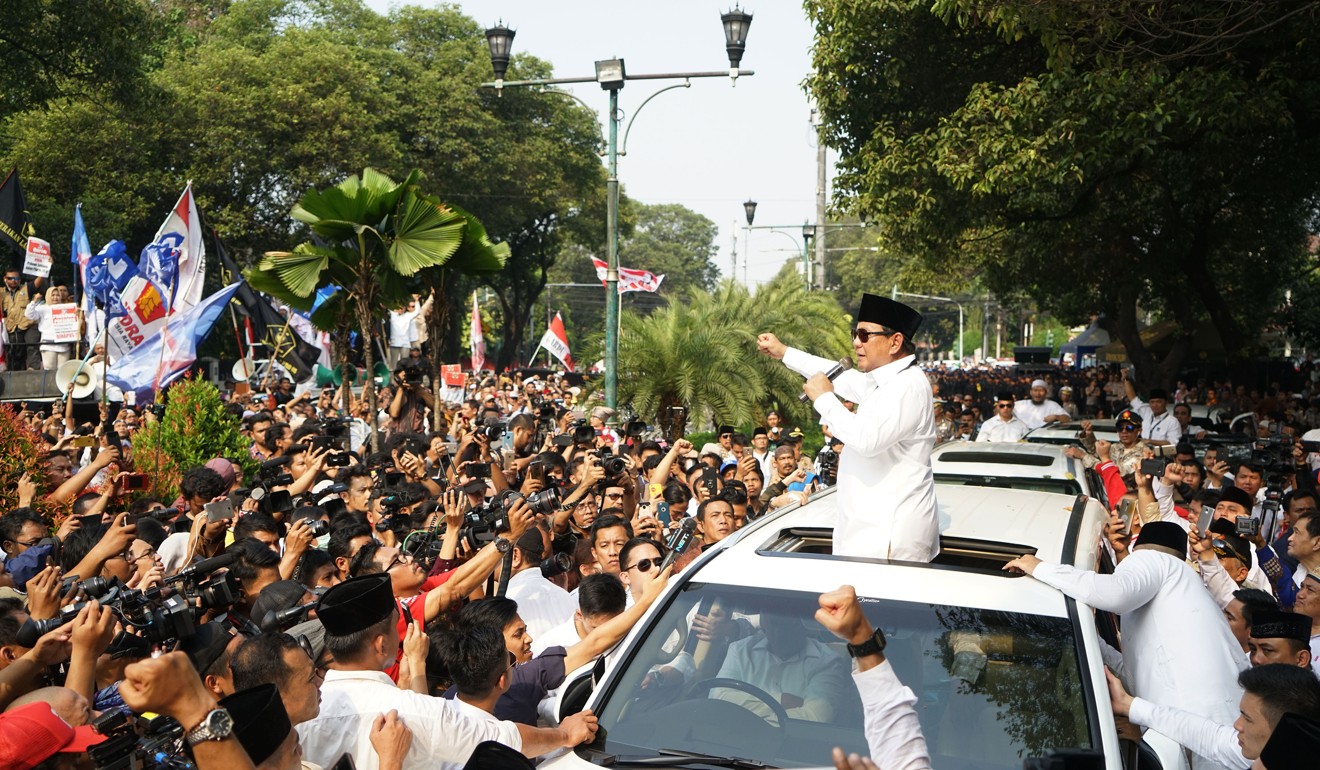
The political power broking around the nominations escalated in recent weeks as a legal petition was made unsuccessfully to see if Widodo’s current deputy, Vice-President Yusuf Kalla, could stand for an unprecedented third term. Former judge and minister, Mahfud MD, was among candidates considered more likely to stand on the president’s ticket.
But rather than attempting to secure the Muslim vote, Douglas Ramage, managing director of Bower Group Asia, said Amin’s appointment was likely driven by party political interests which currently support Widodo but may already be looking towards positioning their own candidates for the 2024 election.
Asia's 'big six' who will be in trouble if China pulls the yuan trigger
“The president’s choice for vice-president was [former judge and minister] Mafud MD, who would make a very good VP, but Jokowi’s coalition partners blocked this, as this would have put [Mahfud] in a very strong position to go on to become president in 2024.
“This specific choice is about parties wanting to protect their own political futures for 2024, more than about securing the Muslim vote.”
Prabowo, meanwhile, has also struggled to convince his political allies to back his choice of Uno. These included former president Susbilo Bambang Yudyono whose son Agus Harimurti Yudyono was touted as a potential running mate for the former general, but is now also setting his sights on 2024.
“This is not an easy process. This process is tiring. I have tried to build a big coalition,” Prabowo said at his residence in South Jakarta on Thursday. “Sandiaga is the best choice there is. He has made a sacrifice. He is willing to resign from his position as deputy governor so that he can serve the nation and the state.”
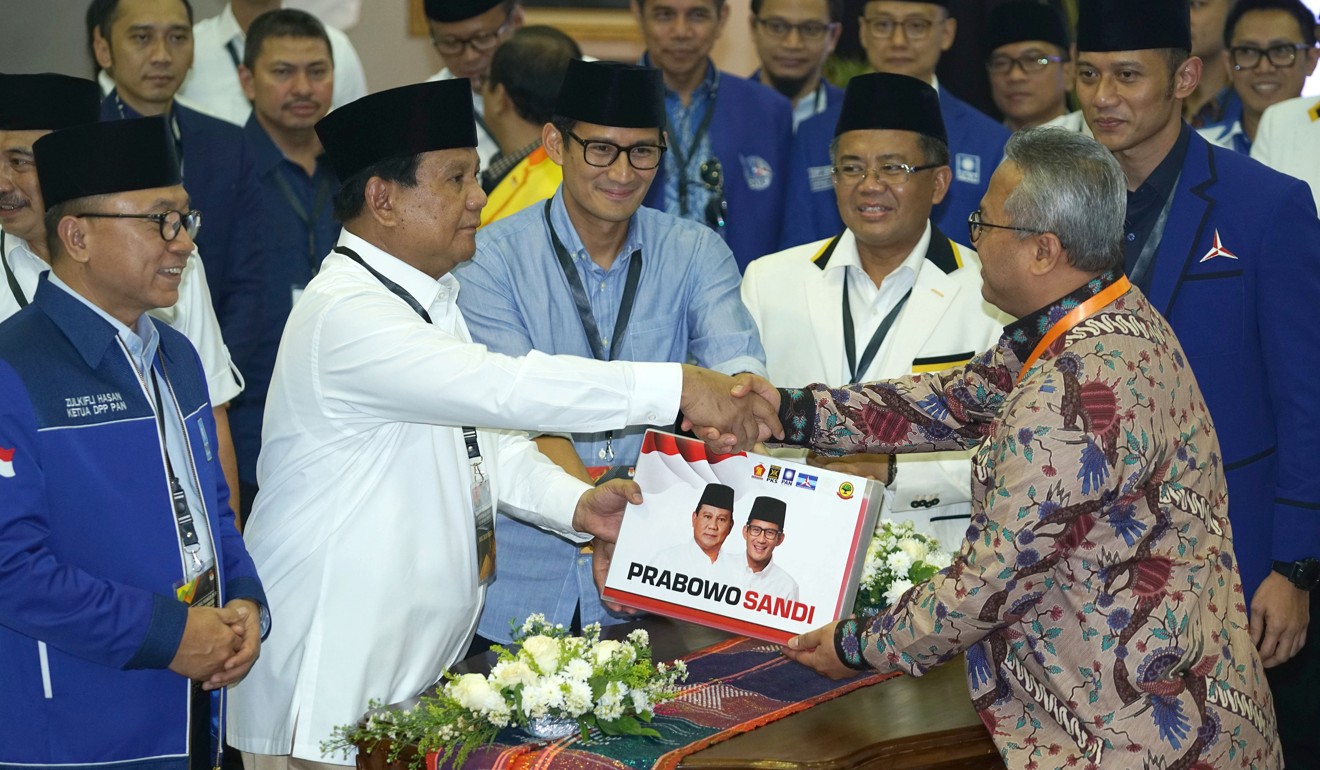
Although previous polls suggested Widodo would be favourite to defeat Prabowo at next April’s polls, this week’s declarations will change the narrative of the pre-election campaign, making the vote harder to predict.
Van der Scharr said Prabowo and Uno would be wise not to hinge their campaign on attacking Widodo’s negatives, and should shift the debate to the economy.
“We have already seen them start talking about stagnant growth in the economy, of rising inequality between rich and poor – which is somewhat ironic because Sandiaga Uno is a very rich man. They will probably do their best to present him as an orthodox, humble Muslim in the campaign ahead.”
Fernandez said: “Prabowo has a chance to move on and campaign on economic issues and the cost of living, which may play to his strengths and resonate with voters because of rising prices and inequality. With his choice of Amin, [Widodo] may lose support from millennials and female voters, and Prabowo could benefit from that.” ■

